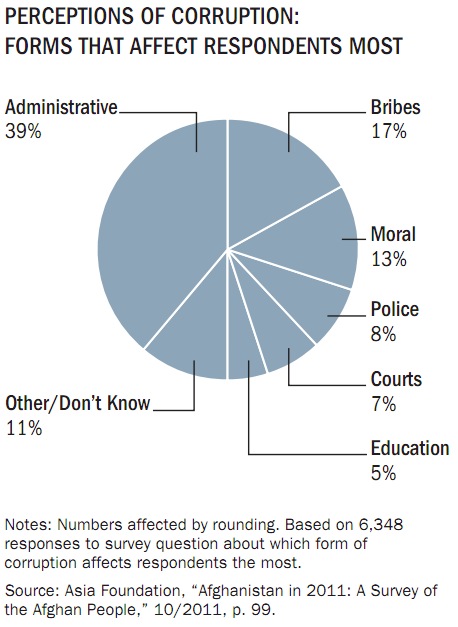 Forget the Republican primaries. What do the polls say in Afghanistan?
Forget the Republican primaries. What do the polls say in Afghanistan?
“Afghans themselves see corruption as pervasive; it affects nearly every aspect of their lives and leads to security concerns, limited economic development, and human rights abuses…”
“[A] large majority of Afghans (76%) see corruption as a major problem in the country; only 5% said it was not a problem…
Corruption frequently affects Afghans in their daily life: 56% saw it as a major daily problem…”
Assuming this survey is accurate, that works out to roughly 17.3 million Afghans who personally deal with corruption on a daily basis.
Also assuming, as the survey indicates, that perceived corruption in Afghanistan takes the form of bribery about 17 percent of the time, one can venture a wild, unscientific guessestimate of the number of bribes that Afghans are asked to pay every year.
That number is just north of 1 billion, or approximately 3 million bribes a day.
I can hear the statisticians screaming. These are huge assumptions. Trying to put a number on bribery in one of the world’s most corrupt countries using a public opinion survey is about as reliable as asking teenagers how often they masturbate. But the surveys do give some sense of scale.
All the information above is quoted from a report released today by U.S. military auditors. The report, a quarterly update from the Office of Special Inspector General for Afghanistan Reconstruction, also offers some numbers on the work it did to tackle that corruption problem during the last three months of 2011.
Here are a few “accomplishments” the office thought noteworthy:
• completed three audits… • participated in investigations that resulted in two individuals sentenced for bribery… • referred 40 individuals and companies for suspension and debarment • opened 20 new investigations…
SIGAR, as this auditing office is known, has a staff of 133. That’s clearly not enough to cover a war that’s costing U.S. taxpayers more than $2 billion a week. And many government and military auditors are honest, dedicated people doing the best they can in a bureaucracy that can bring tremendous pressure to bear against them.
That said, even the most cash-strapped, podunk county prosecutor’s office would be embarrassed by these numbers. Three audits completed. Two bribery convictions. Three million bribes a day.
No wonder “Afghans also said that ISAF and international development partners need to play larger roles in efforts to address the problem.”
The report is titled “10 Years of Reconstruction,” as though what it contains were somehow worth celebrating. In it, the word failure appears 7 times. The word progress appears 81 times.
What the auditors, however well-meaning, cannot say is that the International Security Assistance Force—which brings boatloads of American dollars into the country, and tries to make legitimate statesmen out of guys who are essentially gang leaders—plays a large role in enabling corruption in Afghanistan.
To wit, here’s another “important development” the report offers as a sign of progress:
[T]he MoM awarded China National Petroleum Corporation International (CNPC) the rights to develop three oil blocks in the Amu Darya Basin in the north. The MoM estimated that the basin contains more than 80 million barrels of crude oil reserves, plus a potential of 80 million barrels in yet-to-be discovered reserves. CNPC agreed to pay the government a 15% royalty and has partnered with Watan Oil and Gas Afghanistan Ltd. to begin production within a year.
The U.S. Army banned Watan Oil and Gas from receiving contracts a full two years ago for—you guessed it—corruption! Its security affiliate, Watan Risk Management, is affiliated with some notorious relatives of the U.S.-backed President, Hamid Karzai. Now that the Chinese are paying them, instead of the Americans, everything is presumably above-board.
Progress!